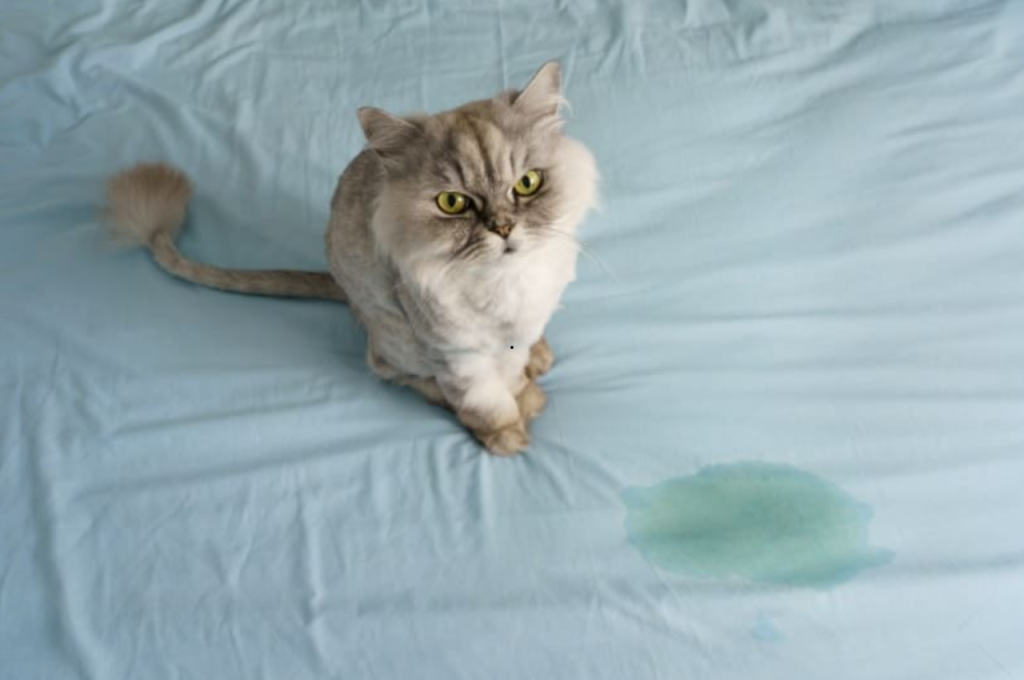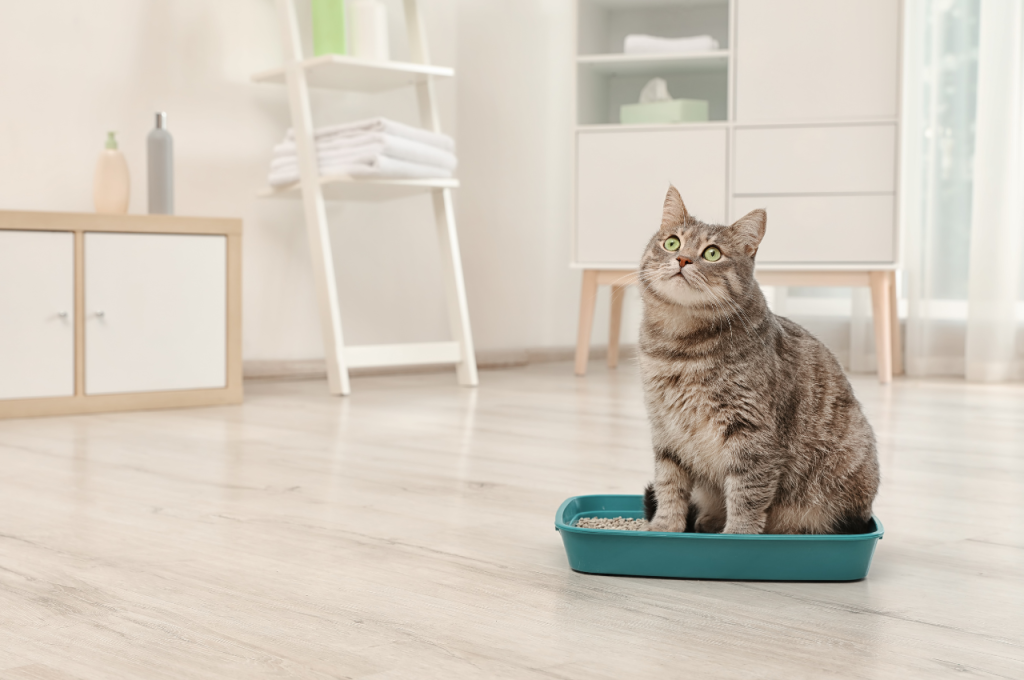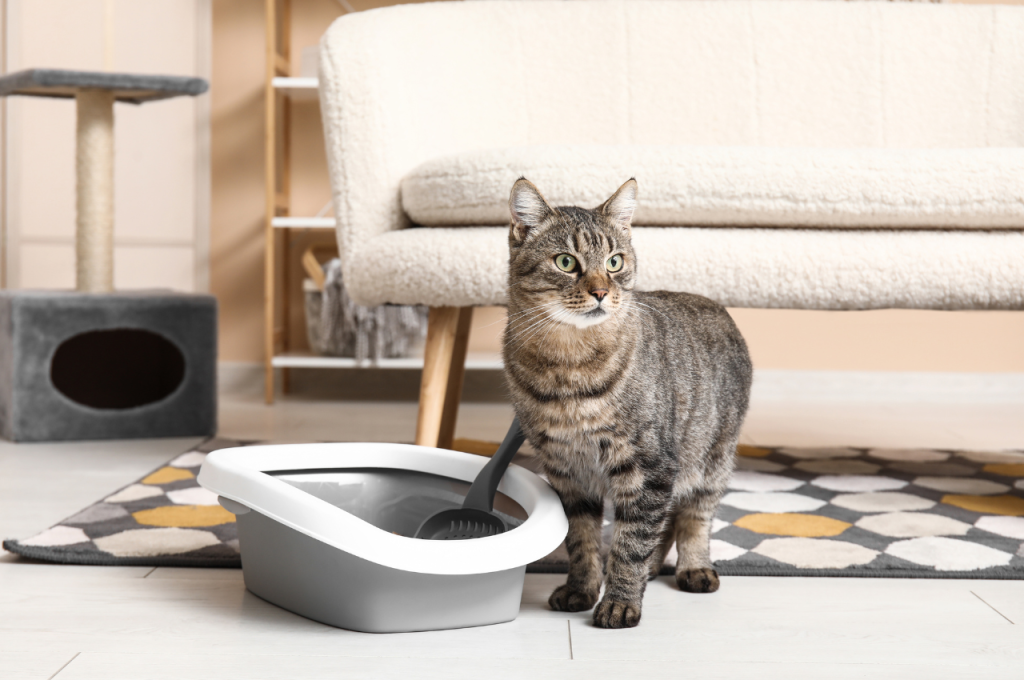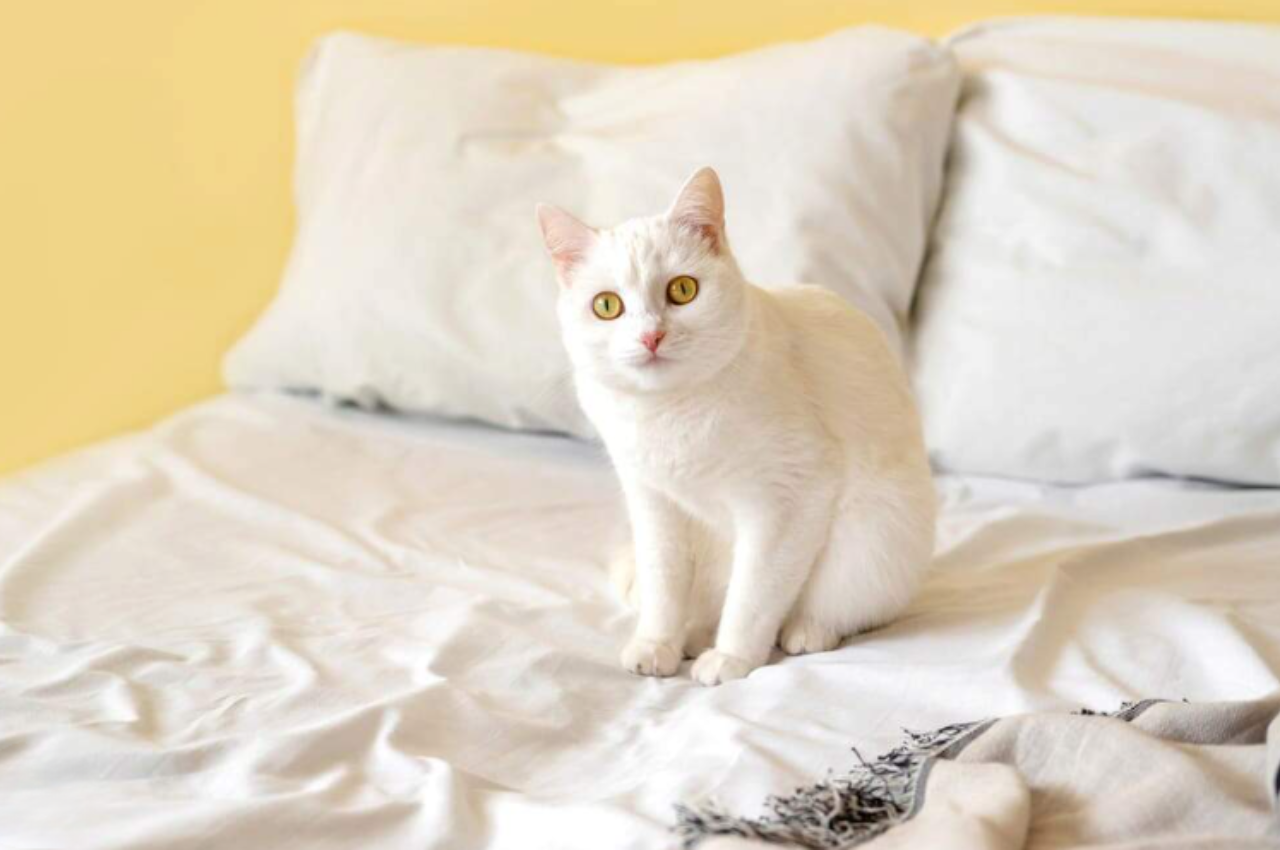To stop your cat from peeing on your bed, try using a pheromone diffuser or providing more litter boxes. Cats often pee outside the litter box due to stress or medical issues.
Addressing these underlying causes can help prevent this behavior. Additionally, make sure the litter box is clean and easily accessible to your cat. Reward your cat for using the litter box properly and avoid punishing them for accidents. Consistency and patience are key when training your cat to use the litter box effectively. By implementing these strategies, you can help discourage your cat from peeing on your bed.
Identifying The Issue
If you’re a cat owner, you’ve probably experienced the frustration of finding urine on your bed. This behavior is not only unpleasant but can also indicate an underlying issue that needs to be addressed. Identifying the cause of inappropriate urination is the first step in stopping this behavior. In this article, we’ll explore the different reasons why your cat may be peeing on your bed and how to address them.

Recognizing Stress Triggers
One of the most common reasons for inappropriate urination is stress. Cats can become stressed due to changes in their environment, such as moving to a new home or the introduction of a new pet. They may also become anxious if their litter box is not cleaned regularly or if they do not have a comfortable place to sleep. If your cat is peeing on your bed, it’s important to identify any recent changes in their environment that may be causing stress.
Once you’ve identified the cause of their anxiety, you can take steps to address it. This may include providing your cat with a comfortable sleeping space, cleaning their litter box more frequently, or using pheromone sprays to help calm them down.
Medical Conditions That Cause Inappropriate Urination
If stress is not the issue, there may be an underlying medical condition causing your cat to pee on your bed. Urinary tract infections, bladder stones, and kidney disease are all common medical conditions that can cause inappropriate urination. If you suspect that your cat may have a medical issue, it’s important to take them to the vet for a check-up. Your vet may recommend a urine test or other diagnostic tests to determine the cause of the problem. Once the underlying medical condition is treated, your cat should stop peeing on your bed.
Identifying the cause of inappropriate urination is the first step in stopping this behavior. Whether it’s stress or a medical condition, addressing the underlying issue is the key to resolving the problem. By taking the time to understand why your cat is peeing on your bed and addressing the issue, you can restore harmony to your home and ensure that your cat is healthy and happy.
Immediate Response Strategies
Discovering that your cat has peed on your bed can be frustrating and unpleasant. However, it’s important to handle the situation promptly and effectively. Implementing immediate response strategies can help prevent your cat from repeating this behavior. This section will outline two key strategies: cleaning the soiled area and temporarily restricting access.
Cleaning The Soiled Area
The first step in addressing your cat’s peeing behavior is to thoroughly clean the soiled area. Cats have a strong sense of smell, and if they detect any residual scent, they may be encouraged to return and pee in the same spot again. To effectively clean the area, follow these steps:
- Remove any bedding or fabric that has been soiled by your cat’s urine.
- Blot the area gently with paper towels or a clean cloth to absorb as much urine as possible.
- Prepare a cleaning solution by mixing equal parts of white vinegar and water.
- Apply the cleaning solution to the affected area, ensuring it penetrates the fibers of the fabric or mattress.
- Let the solution sit for a few minutes to neutralize the odor.
- Blot the area again to remove any excess moisture.
- Finally, sprinkle baking soda over the area and let it sit for a few hours to absorb any remaining odor.
- Vacuum or brush away the baking soda, and the area should be clean and odor-free.
Restricting Access Temporarily
While you work on addressing the underlying cause of your cat’s peeing behavior, it’s important to temporarily restrict their access to your bed. This will help prevent further incidents and give you time to implement behavior modification techniques. Here are some ways to restrict access:
- Close the bedroom door to keep your cat out of the room.
- Use a baby gate to block off the entrance to your bedroom.
- Temporarily move your cat’s litter box to a more accessible and appealing location.
- Provide your cat with alternative comfortable sleeping areas, such as a cozy bed or a cat tree.
- Use deterrents like aluminum foil or double-sided tape to make your bed less inviting for your cat.
By following these immediate response strategies, you can take proactive steps to discourage your cat from peeing on your bed. Remember, consistency and patience are key when addressing behavioral issues in cats.
Behavioral Modification Techniques
To stop your cat from peeing on your bed, try using behavioral modification techniques. Provide a clean and comfortable litter box, and consider using pheromone sprays or diffusers to reduce stress. Additionally, try to spend more quality time with your cat and consult with a veterinarian to rule out any medical issues.
If you are struggling with a cat peeing on your bed, you are not alone. It is a common problem that can be frustrating for cat owners. The good news is that there are several behavioral modification techniques that can help stop your cat from peeing on your bed. In this post, we will discuss two effective techniques: positive reinforcement and creating a comforting environment.
Positive Reinforcement
One of the most effective ways to modify your cat’s behavior is through positive reinforcement. This technique involves rewarding your cat for good behavior and ignoring bad behavior. When your cat uses the litter box instead of peeing on your bed, give them a treat or praise them with a verbal cue. This reinforces the positive behavior and encourages your cat to continue using the litter box.
On the other hand, if your cat pees on your bed, avoid punishing them. Punishment can make your cat anxious and fearful, which can lead to more inappropriate behavior. Instead, clean up the mess and ignore your cat for a short period. This teaches your cat that peeing on your bed does not get attention or rewards.
Creating a Comforting Environment
Another effective technique is to create a comforting environment for your cat. Cats are creatures of habit, and they need a consistent routine to feel secure. Make sure your cat has a comfortable bed, toys, and scratching posts. Also, ensure that their litter box is in a quiet and private location. If your cat is stressed or anxious, it can lead to inappropriate behavior such as peeing on your bed. To reduce stress, try playing with your cat, providing them with a hiding spot, or using calming pheromone sprays. These measures can make your cat feel more comfortable and secure, reducing the likelihood of peeing on your bed.

In conclusion, modifying your cat’s behavior takes time, patience, and consistency. By using positive reinforcement and creating a comforting environment, you can help your cat learn good behavior and stop peeing on your bed. With these techniques, you can have a happier and healthier relationship with your feline friend.
Litter Box Optimization
Optimizing your cat’s litter box setup is crucial in preventing them from peeing on your bed. By implementing the right strategies, you can encourage your cat to use the litter box consistently.
Choosing The Right Location
Select a quiet and private location for the litter box to make your cat feel comfortable using it. Avoid placing it near their food and water bowls to prevent any association between elimination and eating areas.
Maintaining Cleanliness
Regularly scoop the litter box to remove waste and clumps, ensuring a clean environment for your cat. Consider replacing the litter entirely every 1-2 weeks to maintain freshness and cleanliness.
Environmental Enrichment
Environmental enrichment plays a crucial role in preventing your cat from peeing on your bed. By providing stimulating toys and ensuring adequate playtime, you can keep your feline friend mentally and physically engaged, reducing the likelihood of unwanted urination in inappropriate places.
Providing Stimulating Toys
Engaging your cat with interactive toys can help alleviate boredom and reduce stress, preventing them from seeking alternative places to relieve themselves. Look for toys that encourage natural hunting and stalking behaviors, such as feather wands, puzzle feeders, or interactive laser pointers.
Ensuring Adequate Playtime
Regular play sessions not only provide physical exercise but also stimulate your cat’s mind. Spend at least 10-15 minutes engaging in interactive play with your cat multiple times a day. This can include activities like tossing a crumpled paper ball, engaging in wand toy play, or using a remote-controlled toy to encourage movement and mental stimulation.
Stress Reduction Strategies
Introducing Feline Pheromones
Feline pheromones are synthetic versions of the natural chemicals that cats produce. These pheromones can help to reduce stress and anxiety in cats. By introducing feline pheromones in the form of diffusers, sprays, or collars, you can create a calming environment for your cat and discourage them from urinating on your bed.
Creating Safe Havens
Creating safe havens for your cat can significantly reduce their stress levels. Provide them with cozy hiding spots, such as covered beds or enclosed spaces, where they can retreat when they feel overwhelmed. Additionally, providing vertical spaces such as cat trees or shelves can give your cat a sense of security and control, reducing their need to mark their territory on your bed.
Consulting with Professionals
When it comes to dealing with your cat’s inappropriate urination, consulting with professionals is crucial for addressing the issue effectively. Whether it’s a medical problem or a behavioral issue, seeking guidance from veterinarians and behaviorists can provide valuable insights and solutions to prevent your cat from peeing on your bed.
When to Visit a Veterinarian
If your cat suddenly starts urinating on your bed or exhibits changes in litter box behavior, it’s essential to schedule a visit to the veterinarian promptly. Medical issues such as urinary tract infections, kidney disease, or diabetes could be the underlying cause. A thorough physical examination and diagnostic tests can help identify and address any health-related concerns contributing to the problem.
Seeking a Behaviorist’s Advice
When dealing with persistent urination issues, consulting with a certified animal behaviorist can offer valuable insights into your cat’s behavior. Behaviorists can assess the underlying reasons for the inappropriate urination and provide tailored strategies to modify your cat’s behavior. They can also recommend environmental enrichment and behavioral modifications to address the problem effectively.
Preventative Measures for The Future
To prevent your cat from peeing on your bed in the future, try using deterrent sprays or placing double-sided tape on the bed. Also, make sure to clean any previous accidents thoroughly to remove the scent. Providing your cat with a comfortable and clean litter box can also help prevent future accidents.

Cats can be sensitive creatures, and peeing on the bed may be their way of expressing anxiety or discomfort. To prevent future incidents, it’s crucial to take proactive measures to address any underlying issues.
Regular Health Check-ups
Regular health check-ups are essential for identifying any potential health issues that may be causing your cat to pee on the bed. Schedule annual veterinary visits to ensure your cat’s overall well-being. This allows the vet to detect and treat any underlying health conditions early on, preventing them from manifesting as unwanted behaviors.
Continued Behavioral Monitoring
Keep a close eye on your cat’s behavior even after addressing the issue. Observe any changes in their routine or demeanor that could indicate distress. By staying vigilant, you can promptly address any emerging issues before they escalate into unwanted behaviors.
Frequently Asked Questions
Here are commonly asked questions about How to Stop My Cat from Peeing on My Bed:
How Do I Keep My Cat From Peeing on My Bed?
To prevent your cat from peeing on your bed, ensure the litter box is clean and accessible. Use a pheromone spray and provide enough scratching posts. Consult a vet to rule out any medical issues. Try adding a second litter box and providing calming environments.
What Deters Cats From Peeing on Bed?
Cats can be deterred from peeing on beds by keeping the litter box clean and accessible, using deterrent sprays or scents, providing scratching posts, and avoiding stress or anxiety triggers. Additionally, covering the bed or using double-sided tape can also discourage cats from jumping on it.
What Can I Spray on My Bed to Keep My Cat From Peeing on It?
To keep your cat from peeing on your bed, you can use a cat repellent spray specifically designed for this purpose. These sprays have a scent that cats find unpleasant, deterring them from urinating on your bed. Make sure to follow the instructions on the spray bottle for best results.
Does Vinegar Stop Cats From Peeing?
Yes, vinegar can help stop cats from peeing in certain areas as the strong smell is unpleasant for them. Dilute white vinegar with water in equal parts and spray it on the areas where the cat frequently urinates. However, it’s important to note that vinegar may not work for all cats and it’s best to consult with a veterinarian for any underlying issues causing the behavior.
Conclusion
Preventing your cat from peeing on your bed requires a combination of understanding their behavior, providing a suitable litter box environment, and addressing any underlying medical issues. By implementing these strategies, you can create a comfortable and stress-free environment for your cat, reducing the likelihood of them choosing your bed as their bathroom.
Remember to remain patient and consistent in your approach, as it may take time for your cat to adjust to the new routine. With the right guidance and effort, you can successfully stop your cat from peeing on your bed and maintain a harmonious living space.
